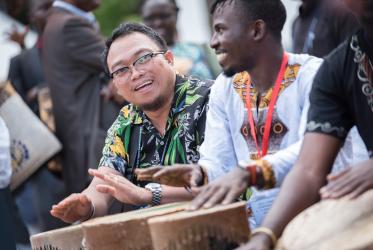The untold stories and neglected potential of women of African descent were in focus at a seminar organized earlier this month by the Pan African Women’s Ecumenical Empowerment Network (PAWEEN), a project of the Ecumenical Theological Education department of the World Council of Churches (WCC), at the WCC's Ecumenical Institute Bossey. This interview with Dr Kimberly M. Lymore is the first in a series featuring insights by some of the participants.
Lymore is a Roman Catholic theologian from the United States. She received a Doctor of Ministry from McCormick Theological Union in 2009. Her thesis was titled, “God Doesn’t Tilt: Making the Connection Between Worship and Justice.” Lymore currently serves as pastoral associate at the Faith Community of St Sabina, and as director of the Catholic Theological Union's Tolton Scholars Program.
Q: Have you experienced solidarity from other women of African descent in your life path? How has it empowered you to contribute to the ecumenical movement and/or to sustainable development?
I have always been involved with Pan-African women in different denominations. However, the PAWEEN gathering has been the most profound experience of solidarity that I have ever experienced. This was a bringing together of very educated and dedicated women who are serious about not only their scholarship but also passionate about using whatever means they have or platform they are given to raise the awareness and alarm on Pan-African girls and women’s issues.
The PAWEEN seminar has empowered me to use whatever platforms I have to raise the issues of Pan-African girls and women not only in the US but also to address the issues that are happening around the world.
Q: What learning are you taking away from this PAWEEN seminar?
Empowered women can accomplish great things when they work together.
Q: What are your intentions for empowering other Pan-African women in the future? How will you follow up on this seminar?
I have been involved with several groups of women. Fierce Women of Faith works on ways that women in Chicago can address the gun violence issue. The other one is National Consortium of Black Women in Ministry which addresses the issues concerning women in ministry and provides a safe space for women in ministry to share their experiences/concerns.
I plan to keep connected with PAWEEN going forth and do whatever I can to push the agenda that we put forth during the seminar.
Q: Are there areas where you still see a special need for solidarity with women of African descent?
The area I see a special need for solidarity is surrounding the violence that is perpetuated on our young girls. This is happening all over the world and we need to bring awareness to everyone that this is happening.
Q: What is the specific role of churches and of the Christian faith in empowering Pan-African women?
The church has a huge responsibility to assist in empowering women because the women provide the majority of leadership in those institutions. There needs to be equal access to education, especially theological education so that women can assume the prestigious roles that have been previously held by men. It is also necessary for the church to stand with Pan-African women around the world in addressing the gross injustices that have been committed against Pan-African young girls and women such as rape, human trafficking, pay inequity, etc.
More information on the Pan African Women’s Ecumenical Empowerment Network
Message by the seminar participants
Recordings of several panels at the PAWEEN seminar are available on the WCC YouTube channel








